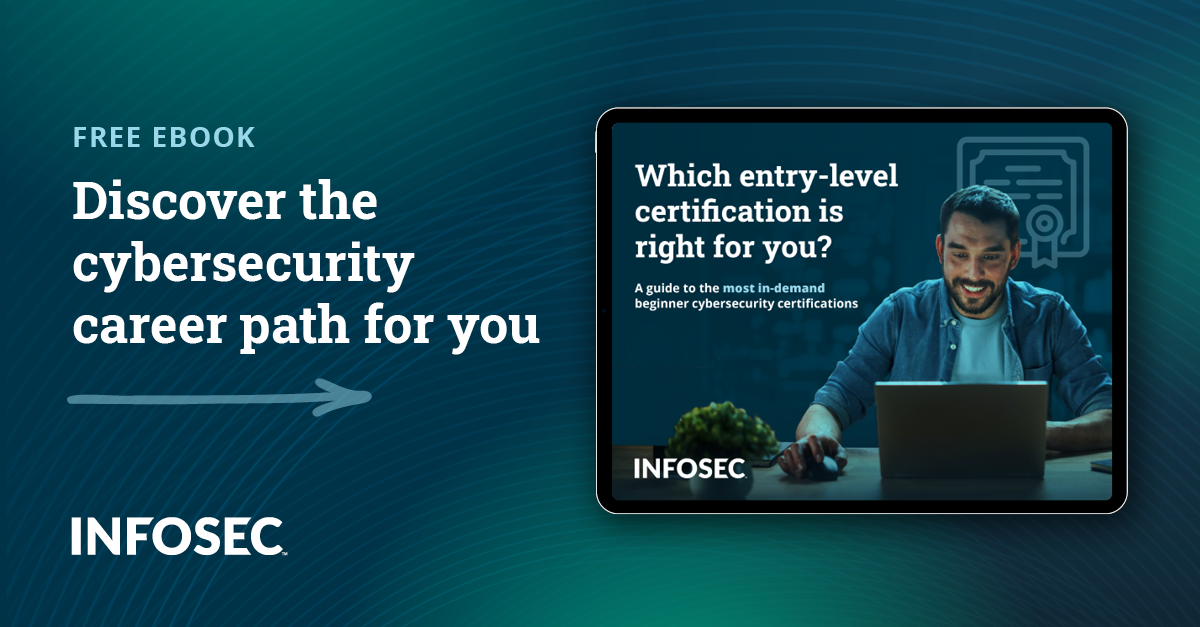Top 10 penetration testing certifications for security professionals in 2025
Penetration testers are security professionals who help organizations find weak spots before potential bad actors do. These ethical hackers use their skills and knowledge to discover vulnerabilities and other issues that could put an organization at risk.
If you're interested in this career path, real-world training and pentesting certifications provide the most direct route to success. Getting certified requires taking relevant pentesting courses or having equivalent experience, plus passing exams that test your knowledge of current tools and methodologies.
For more hacking and cybersecurity resources, enroll in our free Hacking with AI course or download our free Cybersecurity certification ebook.
What should you learn next?

Why you need certifications to be a penetration tester
As organizations increasingly rely on penetration testing to identify gaps in their defense systems, the demand for skilled penetration testers continues to grow. While many security practitioners can examine systems and networks for vulnerabilities, penetration testers bring specialized expertise and training that allows them to think and act like attackers when probing security weaknesses.
The cybersecurity workforce gap remains a pressing challenge. According to the latest ISC2 Cybersecurity Workforce Study, there's a global gap of 4.8 million cybersecurity workers, with over 500,000 workers needed in North America alone. This creates significant opportunities for aspiring penetration testers. CyberSeek reports that vulnerability analysts and penetration testers remain among the most in-demand cybersecurity roles, with over 34,000 U.S. job openings as of January 2025.
Top-tier certifications teach advanced techniques essential for modern penetration testing, including client-side attacks, cloud infrastructure assessment and operating system vulnerability analysis. These credentials validate your expertise to employers while ensuring you stay current with evolving security challenges.
These are the top 10 options for pursuing pentesting certification:
-
Certified Mobile and Web Application Penetration Tester (CMWAPT)
-
Global Information Assurance Certification (GIAC) Penetration Tester (GPEN)
Top 10 penetration testing certifications
1. CompTIA PenTest+
- Exam fee: $392
- Valid period: 3 years
- Example job title: Cybersecurity consultant
The CompTIA PenTest+ certification demonstrates comprehensive knowledge of vulnerability management. The credential validates your ability to plan and scope penetration testing engagements, including vulnerability scanning, compliance requirements, results analysis and remediation reporting.
The exam consists of up to 85 questions combining multiple-choice and performance-based scenarios, with a 165-minute time limit. Content covers five core areas: planning and scoping, information gathering, attacks, reporting and tools. While 3-4 years of hands-on information security experience is recommended, it's not mandatory.
Key benefits:
- Validates proven experience and skill development
- Focuses on current penetration testing techniques
- Tests practical application of ethical hacking concepts
2. EC-Council Certified Ethical Hacker (CEH)
- Exam fee: $1,199, plus a $100 remote proctoring fee
- Valid period: 3 years
- Example job title: Cybersecurity analyst
The CEH remains one of the industry's most recognized cybersecurity penetration testing certs. It offers comprehensive training in thinking like an attacker, featuring experience with professional-grade hacking tools and over 500 attack techniques.
Candidates must complete a four-hour exam containing 125 questions. To qualify, you need official CEH training or approval through an application process demonstrating relevant experience.
Key benefits:
- Learn systematic ethical hacking methodology
- Master complex security concepts
- Develop skills to test and secure organizational systems
3. Certified Penetration Tester (CPT)
- Exam fee: $499
- Valid period: No expiration (recommended recertification every 3 years)
- Example job title: Penetration tester
The Certified Penetration Tester from Infosec marks the first step and is one of the best pentesting certifications for beginners. With over 20 years of experience teaching ethical hacking to cybersecurity professionals, Infosec provides comprehensive training that combines theoretical knowledge with hands-on practice in real-world scenarios. Their training programs cover essential penetration testing concepts, network security fundamentals and vulnerability assessment techniques.
Students learn to use industry-standard tools and methodologies while developing practical skills through interactive labs and exercises. This structured approach ensures professionals gain the knowledge and practical experience needed to succeed in penetration testing roles.
The CPT exam runs for two hours and tests working knowledge across nine domains of penetration testing. This certification serves as a foundation for more advanced credentials.
Key benefits:
- Build a strong foundation in testing methodologies
- Practice network attacks and reconnaissance
- Learn systematic vulnerability identification
- Gain experience with cross-platform exploitation
4. Certified Expert Penetration Tester (CEPT)
- Exam fee: $499
- Valid period: No expiration (recommended recertification every 3 years)
- Example job title: Vulnerability analyst
The CEPT certification demonstrates advanced expertise in penetration testing. Offered alongside the CPT as part of Infosec's Advanced Ethical Hacking Boot Camp, this certification validates your ability to conduct sophisticated security assessments across complex environments.
The two-hour exam includes 50 multiple-choice questions covering nine domains. Candidates must achieve a score of 70% or higher to pass.
Key benefits:
- Advanced training in network attacks, shellcodes and memory corruption
- Skills to counter advanced persistent threats (APTs)
- Real-world scenario practice
- Hands-on experience with advanced exploitation techniques
5. Certified Cloud Penetration Tester (CCPT)
- Exam fee: $499
- Valid period: No expiration (recommended recertification every 3 years)
- Example job title: Web app penetration tester
The CCPT certification validates expertise in testing cloud environments, focusing on the tools and techniques needed for comprehensive security assessment of cloud servers and applications. While no strict prerequisites exist for the Cloud Penetration Testing Boot Camp, understanding cloud concepts and basic penetration testing principles is recommended.
The exam evaluates five key areas: common vulnerabilities, testing tools and processes, security features and cloud-specific reporting requirements. It consists of 50 multiple-choice questions.
Key benefits:
- Specialized knowledge in Azure and AWS penetration testing
- Cloud-specific security tool proficiency
- Practical experience with cloud architecture security
- Skills for managing cloud service provider security
6. Certified Mobile and Web Application Penetration Tester (CMWAPT)
- Exam fee: $499
- Valid period: No expiration (recommended recertification every 3 years)
- Example job title: Web app penetration tester
The Certified Mobile and Web Application Penetration Tester (CMWAPT) certification focuses on testing mobile operating systems and web applications. While no formal prerequisites exist, familiarity with basic penetration testing concepts helps candidates succeed. The certification validates your ability to identify and exploit vulnerabilities across different mobile platforms and web environments.
The two-hour exam tests your knowledge through 50 multiple-choice questions covering Android and iOS vulnerabilities, web application security and mobile attack vectors. A passing score of 70% or higher demonstrates your expertise.
Key benefits:
- Master mobile and web testing methodologies
- Learn platform-specific security assessment techniques
- Develop cross-platform testing skills
- Gain practical mobile app security experience
7. Certified Red Team Operations Professional (CRTOP)
- Exam fee: $499
- Valid period: No expiration (recommended recertification every 3 years)
- Example job title: Red Team operator
Red teaming expands beyond traditional penetration testing to include physical security assessment and comprehensive threat simulation. The Certified Red Team Operations Professional certification validates your ability to conduct full-scale red team operations, including testing building access and sensitive area security.
The two-hour exam covers seven domains: red team roles, assessment methodology, physical reconnaissance, digital reconnaissance, vulnerability identification, social engineering and assessment reporting. To pass, candidates must answer at least 70% of the questions correctly.
Key benefits:
- Comprehensive offensive security training
- Internal defense improvement techniques
- Organization-wide security assessment skills
- Physical and digital security testing expertise
8. EC-Council Licensed Penetration Tester (LPT) Master
- Exam fee: $250/year
- Valid period: 1 year
- Example job title: Penetration tester
The LPT Master represents EC-Council's expert-level certification for penetration testing professionals. It distinguishes highly skilled practitioners who can handle complex security assessments across diverse networks and applications.
This challenging LPT certification requires a minimum 90% passing score on a 24-hour practical exam. Candidates must demonstrate mastery of advanced techniques, including SSH tunneling and multi-level pivoting, while solving complex security challenges in real time.
Key benefits:
- Recognition of elite penetration testing expertise
- Validation of advanced security assessment skills
- Real-world complex problem-solving experience
- Proof of high-level technical proficiency
9. Global Information Assurance Certification (GIAC) Penetration Tester (GPEN)
- Exam fee: $999
- Valid period: 4 years
- Example job title: Penetration tester
GPEN certification, offered through SANS GIAC, provides a vendor-neutral validation of penetration testing expertise. The credential focuses on testing methodologies, best practices and the legal framework surrounding penetration testing activities.
The three-hour exam tests knowledge across 16 areas through multiple-choice questions. Topics include advanced password attacks, vulnerability scanning, privilege escalation, exploitation techniques and web application reconnaissance.
Key benefits:
- Broad infrastructure testing capabilities
- Vendor-neutral certification advantage
- Strong focus on methodology and reporting
- Comprehensive coverage of testing approaches
10. Offensive Security Certified Professional (OSCP)
- Exam fee: $1,749
- Valid period: No expiration
- Example job title: Offensive security engineer
The OSCP stands out for its entirely hands-on approach to certification. Before attempting the certification exam, candidates must complete Offensive Security's "Penetration Testing with Kali Linux" course.
The certification requires passing a 24-hour practical exam that simulates real-world scenarios. You'll face a virtual network containing various operating systems and configurations, requiring you to demonstrate your ability to identify vulnerabilities, execute attacks and provide detailed reporting.
Key benefits:
- Practical experience identifying unknown vulnerabilities
- Mastery of Kali Linux penetration testing tools
- Real-world technical skills validation
- Hands-on exploit development experience
How to choose a certification
Selecting the right penetration testing certification depends on several factors:
- Your current skill level and experience
- Career goals and specialization interests
- Time and budget constraints
- Industry recognition in your target job market
- Recertification requirements
- Testing format preferences (practical vs. theoretical)
Begin by assessing your current knowledge and experience level. Entry-level professionals should focus on certifications that provide broad foundational knowledge. CompTIA PenTest+ and CEH offer excellent starting points, teaching core concepts and methodologies without requiring extensive prior experience. These certifications help build your understanding of security fundamentals while introducing you to essential penetration testing tools and techniques.
For mid-career professionals, consider your specialization interests. If you work with cloud environments, the CCPT certification aligns with your focus. Mobile and web application specialists might benefit more from CMWAPT. Red team enthusiasts should explore CRTOP for its comprehensive approach to security testing. Your choice should reflect both your current role and your future career aspirations.
Research the certification's reputation in your target industry or region. Some sectors, like finance or government, may prefer specific certifications. Talk to professionals in your desired field and review job postings to understand which certifications employers value most. Professional networks and industry forums can provide valuable insights into certification recognition and career impact.
Budget planning should account for more than just exam costs. Factor in training materials, practice tests and potential retake fees. Some certifications also require ongoing education for renewal, adding long-term costs to your investment. Create a comprehensive budget that includes preparation time, study materials and continuing education requirements.
What should you learn next?

Consider the certification's testing format and your learning style. Hands-on exams like OSCP provide practical experience but require intensive preparation. Traditional multiple-choice exams offer different benefits, often covering broader theoretical knowledge that complements practical skills. Match the testing format to your strengths and career needs.
Examine the certification's renewal requirements and process. Some credentials need regular renewal through continuing education or re-examination, while others remain valid indefinitely. Understanding these requirements helps you plan your long-term professional development and certification maintenance strategy.
Frequently asked questions
What qualifications do you need to be a penetration tester?
Most employers look for a combination of certifications, practical experience and technical knowledge. A background in IT or computer science helps, but many successful penetration testers enter the field through self-study and certification programs.
What are penetration tester certification requirements?
Most employers look for a combination of certifications, practical experience and technical knowledge. A background in IT or computer science helps, but many successful penetration testers enter the field through self-study and certification programs.
What is the salary of a penetration tester?
The average salary of an ethical hacker is $134,217, based on an analysis of several public salary sites. For more details on penetration testing salaries and the salaries of other cybersecurity roles and certifications, download our free Cybersecurity salary guide.




